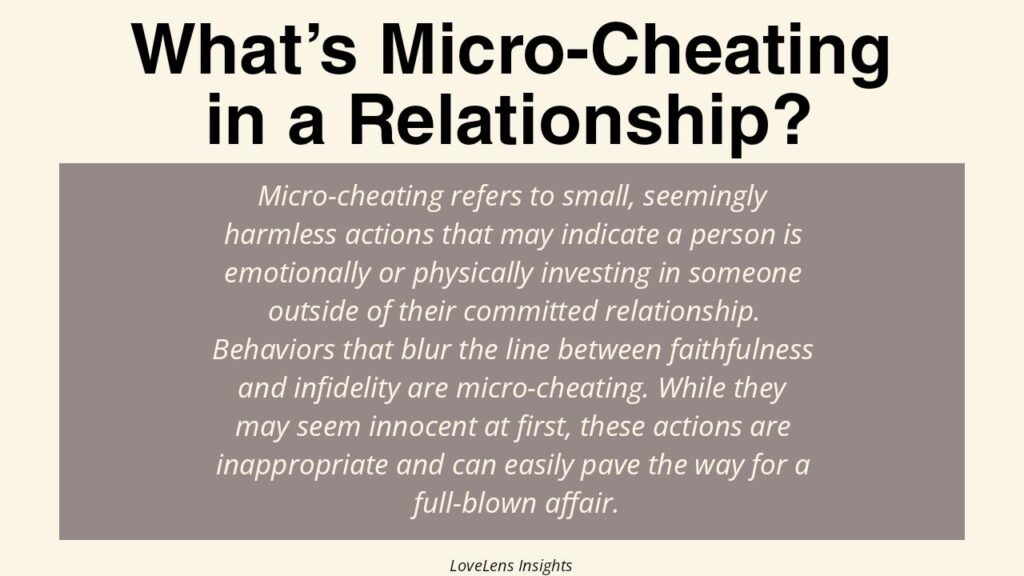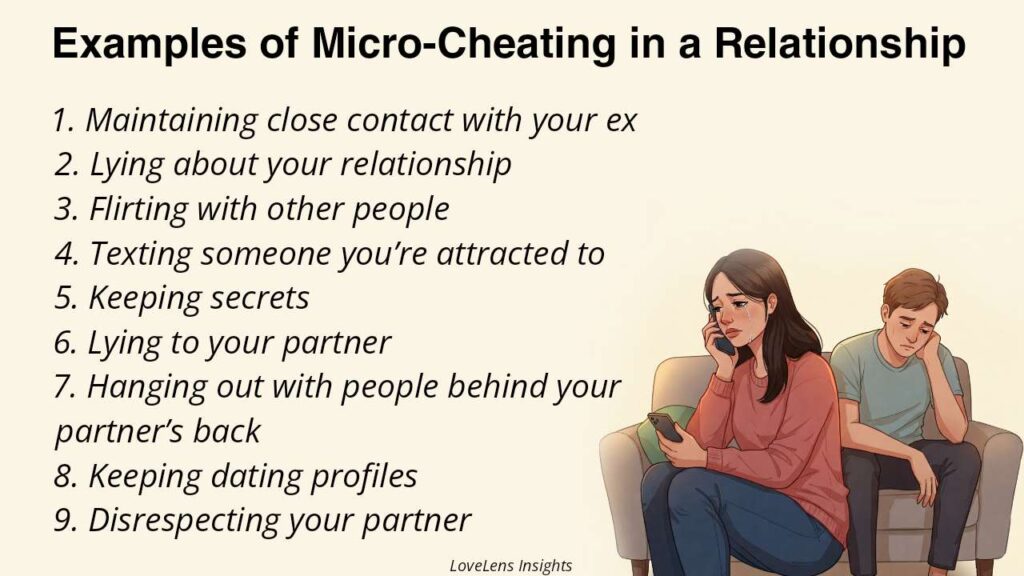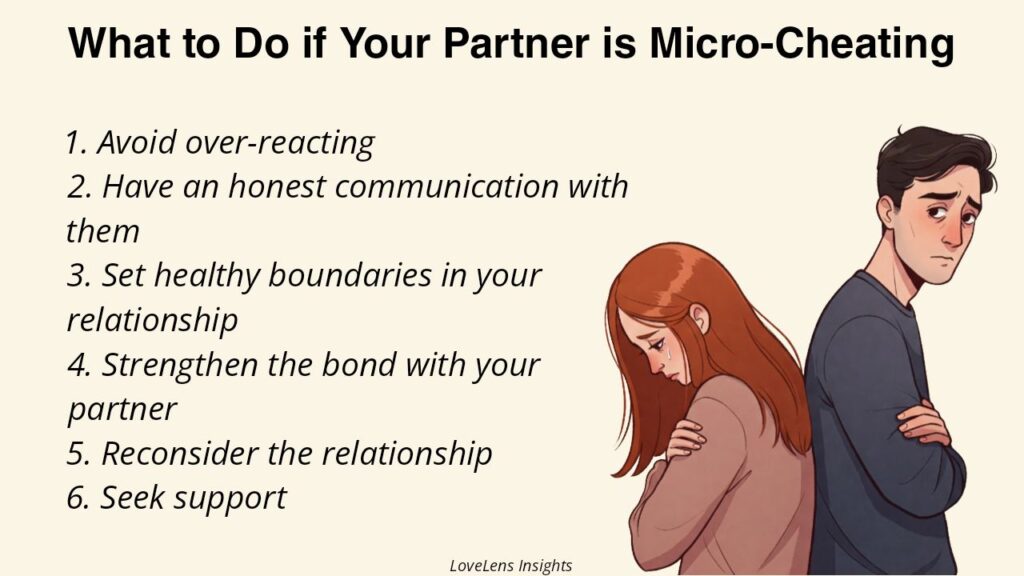Not every betrayal in a relationship comes with obvious signs like secret hotel bookings or hidden phone calls. Sometimes, it’s the smaller, easily dismissed behaviors that quietly take away trust. This is when micro-cheating starts.
Micro-cheating covers those subtle actions like flirty texting, saving a special contact under a fake name, or constantly liking a certain someone’s posts that might not seem like full-blown infidelity but still cross emotional boundaries.
In this article, we’ll break down exactly what micro-cheating looks like, how it can slowly damage a relationship, and why even overlooking or excusing these behaviors in your partner can become a serious issue.
Micro-cheating refers to small, seemingly harmless actions that may indicate a person is emotionally or physically investing in someone outside of their committed relationship. It is a term used to describe subtle actions that interrupt a relationship boundary, such as flirting with someone outside of your relationship.
Behaviors that blur the line between faithfulness and infidelity are micro-cheating. While they may seem innocent at first, these actions are inappropriate and can easily pave the way for a full-blown affair.
Dr Martha Tara Lee, a relationship counsellor, puts micro-cheating as a silent relationship killer that seems harmless but can undermine trust in relationships.
This concept highlights actions that can create feelings of betrayal. It reflects a lack of commitment and can bring significant emotional strain to a relationship, even if it doesn’t involve physical intimacy.
Now that we understand how micro-cheating can quietly undermine trust, let’s look at some real-life examples that reveal just how easily these behaviors can slip into a relationship:
Staying emotionally close to an ex, especially when your partner doesn’t know, can hurt your primary relationship. These emotional ties with your ex can make your partner feel insecure and betrayed. Even if the conversations seem harmless, emotional attachments can quietly grow.
Keeping in touch with a former partner crosses a line if it involves frequent communication or emotional intimacy, suggesting unresolved feelings for the ex. Regular texting, sharing personal details, or lingering feelings with someone else can constitute emotional cheating and hurt your current partner. It’s important to be honest and set clear boundaries if you want to protect and prioritize your current relationship.
When you hide your relationship status or act like you’re single around others, it’s a form of micro-cheating. It shows a lack of respect for your partner and the commitment you share. Even small lies, like saying you’re “just seeing someone,” can hurt the bond between you and your partner.
Also, omitting details about your partner or portraying your relationship as less serious than it is can be considered micro-cheating. Such dishonesty can create a barrier between you and your partner. Denying your relationship status is a red flag. If you hide your partner’s existence or act single around others, it creates distrust.
Flirting is a social and playful way of showing romantic or sexual interest in someone, often without serious intent. It usually involves behaviors like compliments, teasing, smiling, prolonged eye contact, light touching, or playful conversation. It can range from friendly joking to clearer expressions of attraction. If you think it’s just for fun, your partner might feel disrespected or hurt. Plus, that may be the start of an emotional affair.
Respectful behavior means keeping flirtation out of your relationship. If this behavior is hidden from your partner or makes them uncomfortable, it can be considered a betrayal. Even if you don’t do it in front of your partner, it’s worth questioning.
Texting someone you find attractive, especially if you’re hiding it, creates a secret connection that could grow into an emotional and physical affair. Even if the messages seem innocent, your partner may feel betrayed knowing you shared emotional energy with someone else.
When you feel the need to hide your social media interactions, delete messages, or downplay the connection if your partner asks, it shows that you subconsciously know that you’re crossing a line. If it were truly harmless, there wouldn’t be any reason to keep it secret.
The combination of attraction plus secrecy is what makes texting someone else a form of micro-cheating, not just the act of texting itself.
Hiding information or aspects of your life from your partner is a form of micro-cheating. Keeping secrets about interactions with other people, especially those you feel a connection with, can harm your relationship deeply. Even if it’s not physical, hiding things creates distance, distrust, and ultimately a lack of intimacy in the relationship.
Secrets make your partner question what else you might be hiding, therefore creating distance, making your partner feel excluded or unimportant. These seemingly minor actions suggests a lack of transparency and can lead to feelings of betrayal.
Hiding messages, meetups, and feelings from your partner erode trust. Honesty is key in any strong relationship. Healthy, intimate relationships thrive on openness. If you’re guarding something, ask yourself why. Otherwise, it constitutes micro-cheating.
Lies, no matter how small, can grow into bigger problems. When you lie to your partner about who you’re talking to, where you’ve been, or what you feel, it creates a crack in your relationship. Micro-cheating often involves these small lies that seem harmless but pile up over time. Relationships need honesty to survive.
Lying undermines the foundation of trust in a relationship. Even white lies can accumulate and create a pattern of deception, which can damage the emotional connection between partners and breed conflicts in relationships. Dishonesty makes your partner question everything, even the genuine part of the romantic relationship. Truth builds security, lies break it. If you’re lying, examine what you’re protecting and if it’s worth risking your relationship for.
Physical contact without your partner’s approval or consent can indicate disrespect or betray trust. It’s not just about what happens during those hangouts, but the secrecy surrounding them. The secrecy suggests an awareness that the behavior is inappropriate, undermining the openness expected in a healthy relationship. This can lead to feelings of betrayal and start physical infidelity.
Micro-cheating thrives in these hidden spaces, often causing hurt and emotional distance even when physical boundaries aren’t crossed. Transparency is key to keeping your relationship grounded in trust.
Even if you’re not actively swiping, keeping an old dating profile sends a quiet but powerful message: you’re not fully committed. It might seem innocent, maybe you’re just “seeing who’s out there.” However, it suggests an awareness that the behavior is inappropriate, thus weakening the bond your partner believes you share. Micro-cheating like this encourages insecurity and leaves room for emotional drift.
Constantly belittling, ignoring, or dismissing your partner’s feelings constitutes disrespect. Speaking poorly about your partner, especially in a dismissive tone, is a form of betrayal.
Micro-cheating often begins here: minimizing your partner’s value to feel closer to someone else. This behavior weakens their self-esteem and the foundation of mutual regard in the relationship.
Respect should remain solid, even when frustrations arise. Protecting your partner’s dignity in public and private spaces is vital to maintaining a healthy, respectful relationship.
Micro-cheating might look harmless at first, but gradually, it can have a serious impact on your relationship. Seemingly harmless actions, like a flirty text message, a secret conversation, or staying in close contact with an ex-partner, can slowly fade the foundation of trust that your relationship is built upon.
Shavi N., a counseling psychologist stated that “micro-cheating can erode trust, create feelings of insecurity, and blur boundaries in relationships. If left unchecked, it can lead to more significant emotional or physical connections.”
Micro-cheating creates emotional distance, making your partner feel insecure. When one person engages in these behaviors, the other may start to feel less connected and not fully invested in the relationship. This can lead to feelings of isolation, loneliness, and a breakdown in communication, as both partners may become less willing to share their thoughts and feelings openly. As a result, resentment can begin to build quietly, further damaging the relationship.
This can damage self-esteem, as both partners may start to question their worth and wonder if they are enough for each other. To prevent these negative effects, couples should have open and honest conversations about their expectations and boundaries. Establishing a strong sense of mutual respect and transparency early can help protect the relationship from the quiet, creeping disconnection that micro-cheating often causes. With this, couples can build a stronger and more resilient foundation for their love.
Realizing that your partner might be micro-cheating can be upsetting. To some, it is just harmless flirting, and to others, it is emotional dishonesty. It’s important to approach the situation calmly and thoughtfully to address the issue effectively. Here are some steps you can take to prevent micro-cheating.
Discovering micro-cheating triggers intense emotions, but reacting impulsively might worsen the situation. It is natural to feel hurt, angry, upset, betrayed, insecure, or even ashamed, but try to stay calm. Avoid overreacting, as it may shift focus away from the real issue and hurt both of you more than necessary
Instead, stay calm. A calm approach allows you to think clearly, understand what actually happened, and take the next step. When you approach the conversation with curiosity, not accusation, it fosters understanding and better conflict resolution.
Initiate an open and honest discussion with your partner about your concerns. Clearly express how their actions make you feel without placing blame and why you consider them a violation of your boundaries. Avoid assumptions, focus on facts and feelings.
Actively listen to your partner’s perspective and try to understand their intentions. Honest communication can clarify misunderstandings and pave the way for resolution.
Once you’ve told your partner why you’re upset and have heard their side of the story, work with them to clearly redefine the boundaries of your relationship. Decide what behaviors are acceptable and unacceptable for you. This process may take time and should be carefully considered with the input of both partners to prevent future misunderstandings and protect the relationship.
Setting healthy boundaries isn’t about control, but about creating a sense of security and mutual respect. If boundaries keep being crossed, it may signal deeper issues. Revisit these agreements regularly to ensure you two feel respected.
Focus on rebuilding intimacy, connection, and satisfaction in your relationship. Spend quality time together, engage in activities you both enjoy, and express appreciation for one another. Strengthening your bond can help reignite the spark and remind you both of the value of your relationship.
Work on rebuilding communication with each other, prioritize vulnerability, and shared experiences to foster a deeper connection. The Relationship experts often suggest that couples who prioritize quality time are less likely to seek external validation.
If micro-cheating persists despite your efforts to communicate and set healthy boundaries, it’s important to pause and evaluate if the relationship truly serves your emotional needs. Ask yourself if your values are aligned and whether you can truly trust your partner. If trust is repeatedly broken, it may be time to walk away. Staying in distrust can harm self-worth.
It’s essential to prioritize your emotional well-being and make decisions that are in your best interest, even if it means ending the relationship. Reassessing the relationship doesn’t mean rushing to end things, it means honestly deciding whether staying will bring long-term happiness and security.
Dealing with micro-cheating can be emotionally challenging. It can cause stress, heartache, and even trauma. If you need help processing your feelings around the situation, reach out to trusted friends and family members for support and guidance.
It can be helpful to seek therapy from a therapist, particularly if you’re not comfortable discussing it with your loved ones. Couples counseling can help navigate betrayal and rebuild trust. You don’t have to handle it alone. They help you process the betrayal and empower you to make clear, healthy decisions moving forward in the relationship.
To wrap up, here are some key takeaways for understanding and addressing micro-cheating in your relationship:
Micro-cheating means crossing the physical or emotional boundary of a relationship. It is when someone engages in subtle actions that demonstrate interest in someone outside of their own relationship.
Red flags discussed above include excessive texting with someone else, flirting, hiding interactions, or prioritizing another person’s needs over your own. If your partner dismisses these concerns and acts defensively, it could be a sign.
Communicate openly, define clear boundaries, and rebuild trust through transparency. Seek support if necessary, and decide if the relationship can be repaired or if separation is the best option.


